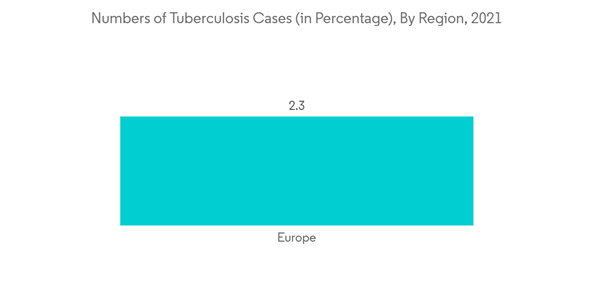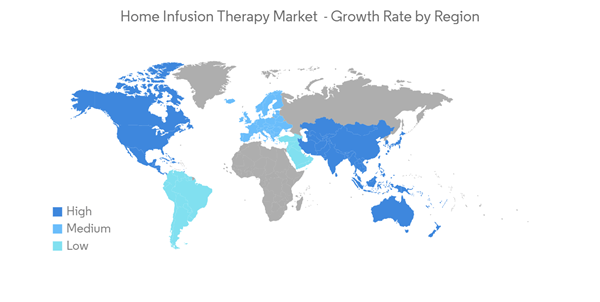Key Highlights
- As cases of COVID-19 increased in 2020, the use of alternate site solutions rose in high demand, and home and specialty infusion providers played a critical role in supporting patients. However, initiatives by key market players were expected to increase market growth. For iet growth. For instance, in July 2021, Eitan Medical opened a new office for the DACH region located in Germany to expand its customer base. Its Sapphire infusion system was EU MDR certified and served clinicians in hospitals and home care environments across Europe. The pump was designed to deliver a wide range of therapies for varied clinical use cases. Similarly, in January 2021, Amedisys collaborated with Option Care Health to deliver COVID-19 infusion therapy to the vulnerable population. Thus, such initiatives were expected to increase market growth.
- The growth of the market is attributed to improved patient outcomes, cost-efficiency, and patient convenience provided by home infusion therapy. The growing number of baby boomers suffering from decreased mobility profiles such as osteoarthritis, paralysis, and diabetes will boost the demand for home infusion therapy. The rising need to reduce the duration of inpatient stays is anticipated to fuel the market development. Continuous subcutaneous (SC) apomorphine infusion is an effective therapy for Parkinson's disease (PD), and various drug formulations are available for treating PD using the subcutaneous mode of delivery. Thus, with the increasing burden of PD, the demand for subcutaneous infusion therapy is rising. For instance, as per the 2022 data update by the Parkinson's Foundation, approximately 90,000 people are diagnosed with PD annually in the United States, and nearly 1.2 million people in the country are estimated to be living with PD by the year 2030. In addition, as per the source above, the incidence of PD has increased in North America in the past decade, and it is estimated that men are associated with a higher incidence of PD than women. As a result, techniques for administering infusion therapy at home or in other healthcare settings have been developed, which is also anticipated to support market expansion. The majority of home infusion providers still use conventional infusion pumps despite hospitals quickly adopting smart infusion pumps with fascinating features like EHR connectivity, drug libraries, and medication safety software. However, there has been a growing trend for the up-gradation of equipment owing to its increasing demand, especially in developed countries.
- Furthermore, in December 2021, Baxter International completed the acquisition of Hillrom. This acquisition will help the company broaden its geographic footprint and integrate medical device technology that will enhance patient care, lower costs, and increase workflow efficiency. Moreover, in March 2021, Terumo and Glooko, a remote patient monitoring software and mobile apps company, announced technological integration to deliver new diabetes data solutions together globally. The partnership will allow the integration of data from Terumo's diabetes care devices into Glooko'sdiasend diabetes data management platform. Similarly, in June 2021, Aducanumab (Aduhelm) received accelerated approval as a treatment for Alzheimer's disease from the United States Food and Drug Administration (FDA). This is the first FDA-approved infusion therapy to address the underlying biology of Alzheimer's disease. Thus, such acquisitions and product launches are expected to boost the growth of the market over the forecast period. However, the high cost associated with the infusion pumps may hamper business growth during the forecast period.
Home Infusion Therapy Market Trends
Anti-infective Therapy Dominates the Home Infusion Therapy Market
- The anti-infective therapy segment is expected to dominate the global home infusion therapy market through the forecast period. Anti-infective therapy is one of the most prescribed home infusion therapies. However, there are few risks intrinsic to such therapy, which can be reduced by a team approach, coupled with careful patient selection criteria, a structured follow-up process, and an emphasis on patient education.
- The major factors for the growth of the infectious disease drugs market are the rising awareness activities by various government and non-profit organizations, the increasing prevalence of infectious diseases, and the rising funding and increasing research and development activities.
- For instance, according to the data published by the World Health Organization (WHO) in the Global Tuberculosis Report 2021, stated that the majority of tuberculosis cases were discovered in the WHO regions of South-East Asia (43%), Africa (25%), and the Western Pacific (18%). Similarly, according to the WHO data published in 2021, with 95% of all malaria infections occurring in Sub-Saharan Africa, this region is likely to continue to experience a heavy burden from the disease. Thus, the rise in the burden of several infectious diseases across developed and emerging markets is expected to drive the market studied.
- Thus, the increasing burden of infectious diseases in various countries and increasing research and development activities are likely to increase the demand for anti-infective therapy, thereby boosting the segment's growth.
North America Dominates the Market and the Region is Expected to Continue the Same during the Forecast Period
- North America is one of the major regions in the home infusion therapy market, owing to the presence of factors such as the increasing prevalence of chronic diseases, treatment costs, technological advancements, and product launches, which are expected to drive regional growth. For instance, according to the estimates of the American Cancer Society updates from 2021, in the United States alone, there were around 1.8 million new cancer cases reported in 2020.
- Breast cancer, lung cancer, prostate cancer, colorectal cancer, bladder cancer, and skin cancer are the most prevalent malignancies in the United States. Furthermore, due to cheap costs and improved patient mobility, there is a growing migration from acute care to home care settings, which is anticipated to spur additional expansion. The demand for regional goods is also being boosted by improvements in the healthcare industry and the use of increasingly sophisticated medical items.
- On the other side, the market has growth prospects in the home healthcare segment owing to sufficient insurance coverage for home infusion. Several companies, such as Option Care Enterprises, CHI Health, etc., provide infusion therapy services in home healthcare settings, and the cost is also covered by insurance coverage.
- In May 2021, Smiths Medical and Ivenix, Inc. announced a partnership agreement to offer a comprehensive suite of infusion management solutions in the United States market. This partnership is expected to evolve infusion management to improve patient safety. Such partnerships are expected to bolster the growth of the market in this region.
- Thus, the abovementioned factors are expected to increase market growth.
Home Infusion Therapy Industry Overview
The market for home infusion therapy is highly competitive and consists of global as well as several regional players. Due to technological advancements, small and mid-sized companies are focusing on market penetration to grab market share. The major players in the market include B. Braun Melsungen AG, ICU Medica, Becton Dickinson and Company, Option Care Health Inc., and CareCentrix Inc., among others.Additional Benefits:
- The market estimate (ME) sheet in Excel format
- 3 months of analyst support
This product will be delivered within 2 business days.
Table of Contents
Companies Mentioned (Partial List)
A selection of companies mentioned in this report includes, but is not limited to:
- B. Braun Melsungen AG
- Baxter International
- Becton Dickinson and Companies
- Catholic Health Initiatives
- Community Surgical Supply
- Eli Lilly and Company
- Fresenius Kabi
- ICU Medical Inc.
- McKesson Medical-Surgical Inc.
- McLaren Health Care
- Nipro Corporation
- Option Care Health Inc.
- Smiths Medical
- Sutter Health
- Terumo Corporation










